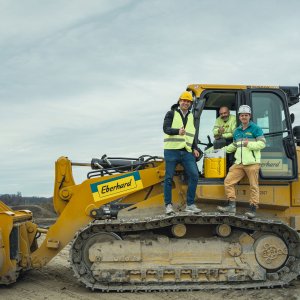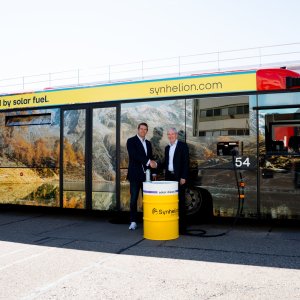Synhelion starts construction of DAWN – the first industrial demonstration plant to produce solar fuels
Jülich, Germany, September 6, 2022
With today’s groundbreaking ceremony, Synhelion marks the start of construction work on DAWN – the world’s first industrial plant to produce synthetic fuels using solar heat. Located in Jülich, Germany, the facility will be the first to demonstrate the entire process from concentrating sunlight to producing synthetic liquid fuel on an industrial scale. SWISS will be the first airline to fly using the CO2-neutral solar kerosene produced there.
From the lab to industrial production
Synhelion is a spin-off of ETH Zurich and a pioneer in solar fuels, which are produced by reversing the combustion process. The fact that the production process can be powered exclusively by solar heat – and without the use of electricity – was first demonstrated in 2019 in a mini-refinery on the roof of ETH Zurich. Since then, Synhelion has been focusing on scaling up the technology and making it industrially viable. A few weeks ago, the last major technological milestone for the industrial production of solar fuels was reached with the production of solar syngas on an industrial scale. DAWN will be the first industrial-scale plant to use all the innovations developed by Synhelion. The demonstration plant will also serve as a model for future commercial plants.
The dawn of solar fuels
The DAWN plant consists of a 20-meter-high solar tower and a heliostat field with a mirror surface of 1’500 m2. The precise control technology of the heliostat field was developed by Synhelion and guarantees optimal use of land resources and building materials. The solar tower houses three innovations developed by Synhelion: a solar receiver, a thermochemical reactor, and a thermal energy storage that enables cost-efficient operation around the clock. The industrial demonstration plant will produce several thousand liters of fuel per year. The fuels produced (solar kerosene and gasoline) will be used to demonstrate various possible use cases. SWISS will be the first airline to fly on Synhelion’s solar kerosene. If the same plant were built in a particularly sunny location and operated around the clock, it could produce about 150’000 liters of fuel per year. Future planned plants will exceed the size of DAWN and offer a significantly higher production capacity.
Jülich site offers ideal logistic conditions
The demonstration plant will be built at Brainergy Park in Jülich, Germany, which offers Synhelion ideal logistic conditions. Jülich is not only the headquarters of Synhelion Germany, but also the location of Synhelion’s project partners, the German Aerospace Center (DLR) and the Solar Institute Jülich of Aachen University of Applied Sciences. The German Federal Ministry for Economic Affairs and Climate Action (BMWK) is supporting the construction and operation of DAWN with EUR 3.92 million. In the long term, the DAWN facility will be mainly used for research and development purposes.
Patrick Hilger, Managing Director of Synhelion Germany comments: “With the construction of DAWN, Synhelion can prove its successful business model and establish itself as a serious player among synthetic fuel producers. The plant will demonstrate that solar fuels are not just a theoretical construct but will soon actively contribute to decarbonizing aviation and long-distance transportation.”
Dr. Gianluca Ambrosetti, CEO and Co-Founder of Synhelion adds: “With DAWN we are laying the foundation for the industrial production of solar fuels. The experience we gain will benefit us in the construction of many more and larger plants. Our goal is to reach a production capacity of 875 million liters of fuel per year in future commercial plants by 2030.”
For more information about DAWN, please click here.
For the full English press release, see here.
For the full German press release, see here.



